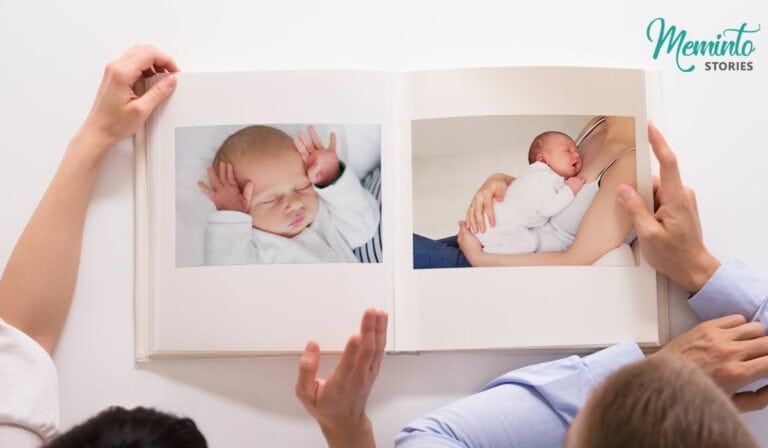Barbara still hears her mother’s voice in the memory book they created together. Every time she misses her mum, she opens to a random page and hears those familiar stories again. “We made a lot of audio recordings when she was still alive,” Barbara says. “Now I can hear her laugh whenever I want.”
That’s what happens when families take time to capture grandparent stories properly. Most photo albums show what someone looked like. A grandparent’s memory journal lets you hear their stories, see their choices, and learn from their mistakes.
Your grandparents likely have incredible stories that you have never heard. How much do you know about their childhood, their first job, or the day they fell in love? Most families probably feel they don’t have enough stories. Once those stories are gone, they vanish forever.
The good news is that creating these books is easier than you imagine. You don’t need special skills or fancy tools. Just find a good memory book for grandparents and some conversation starters that fit.
Why grandparent memory books are different from regular scrapbooks
Your grandmother’s old family story photo book tells you she went to college. A grandparent memory book shares that she was the first woman in her family to graduate. It also reveals how she saved money by eating crackers for lunch and why education mattered so much to her.
Regular scrapbooks collect moments. Memory books collect meaning.
When Viktoria created books with her son, they didn’t paste in old photographs. They recorded almost a century of history across 16 German books and seven English ones. “My family lives in various locations,” she explains. “They were very happy” to understand where they came from, finally.
The difference shows up in how families react. A scrapbook gets a quick flip-through and goes back on the shelf. Memory books get read over and over. Gail’s grandchildren always ask for more stories from her book. It shares 100 years of her life. “There was a lot to tell, and my grandchildren were happy.”
Do you recall the old photo labelled “Dad in 1952”? A memory book turns it into something real. You learn why Dad left home at the age of 16. You can discover what he packed in that old suitcase. You’ll see how leaving changed his life completely. The story grows beyond what you can see in the picture.
Most scrapbooks focus on the good times. A grandparent keepsake book includes tough times, too, as that’s where real wisdom lies. They capture the whole person, not just the highlights. When Albert’s grandfather died, 17 family members gathered to honour his life. “I was able to read so many new stories about him that I didn’t know yet,” Albert says. Those weren’t stories that would have made it into a regular photo album.
7 memory book ideas for grandparents to celebrate family stories and wisdom
Willi had fun writing his memory book, but he started with no plan at all. He just answered one question each week and let the stories flow naturally. Six months later, he had a complete book that his great-grandchildren treasure.
You don’t need a perfect outline to start. Here are seven Memory book ideas for grandparents. They provide an easy way for everyone to join in. They also include conversation starters to help quiet grandparents take part.
1. The family origin stories
Every family has that one story about how they ended up where they are. Your grandfather might have jumped on a boat with just hope and twenty dollars. Or maybe your grandmother met him after taking the wrong bus home from work.
These aren’t just cute family tales. They’re about your family’s legacy. They explain why your family values hard work. They share why you’re cautious of strangers and why there’s always extra food at home.
Karl used Meminto to write a flexible book about his family’s journey, and they printed 300 copies at once. “That was 25 large and heavy boxes, a really nice project!” His family couldn’t get enough of learning where they came from.
Prompts to get them talking:
- How did our family end up in this town?
- What did great-grandmother pack when she left the old country?
- Who was the first person in our family to own a car or a house?
- What jobs did people in our family do back then?
- What was the biggest risk someone in our family ever took?
Begin with your family’s immigration stories. Ask about the first generation born in America. Discover what they left behind and what they hoped to find.
2. Lessons from hard times
Barbara listens to her mother’s voice whenever she needs guidance. “We made a lot of audio recordings when she was still alive,” she says. The tough lessons from the Great Depression and wartime rationing support Barbara in her difficult times now.
I’ve noticed something about families who record these tough stories. Grandparents often feel unsure at first. They don’t want to “complain” or focus on the negative.” But these are precisely the stories that matter most. My grandfather often brushed off questions about his tough childhood. He’d say, “We got by just fine.”” Then one day, he revealed that his family lived on potato soup for three months.
Prompts to get them talking:
- What was the most challenging year of your life, and how did you get through it?
- When did you have to choose between paying for food and paying rent?
- What did you learn about people during the tough times?
- How did your parents keep the family going when money was tight?
- What would you do differently if you faced those same problems today?
Your grandparents lived through things you’ve only read about in history books. They know what it feels like when everything falls apart and how to rebuild from nothing. These aren’t just survival stories. They show us the hard choices we face when there are no good options.
Families are often surprised by how proud their grandparents feel when someone wants to hear their stories. Their shame about being poor or struggling fades when they see their experiences as valuable wisdom to share.
3. Love stories and friendship tales
“Tell me about the first time you saw Grandpa.” That simple question can spark tales of dance halls, spilled drinks, and three months of letters before a real date. I bet your grandparents’ love stories are better than any romance film. They’re real, messy, and packed with details that will make you laugh.
Your grandparents didn’t just swipe right. They wrote letters, waited by phones, and had to ask permission to court someone. Their friendships lasted decades without social media to keep them connected. Jessica and Marco created their wedding book. Guests shared stories about their relationship that they had forgotten. “We can always pick it up and dive back in,” they say.
Prompts to get them talking:
- How did you know Grandma was the one for you?
- What was your first fight about, and how did you make up?
- Who was your best friend growing up, and what trouble did you get into together?
- What was dating like when you were young?
- Which friend have you known the longest, and how did you stay close?
I always remind people to think of friends who missed the wedding photos but still mattered. Find out about crushes that didn’t work out and the people who believed in them when nobody else did. These aren’t just sweet stories. They show that true love needs effort. Real friendship can handle anything life throws our way.
4. Family recipes & kitchen memories
I bet your grandmother’s apple pie recipe went with her. No one wrote down the “pinch of this” and “handful of that” measurements she used. Every family has lost recipes like this one, along with the stories that made them special.
Kitchen memories aren’t just about food. They’re about who showed your grandfather how to make his famous chili, why your great-aunt baked extra cornbread for the neighbours, and what your family ate during hard times. These stories connect food to love, tradition, and survival.
Lynn spent 70 years gathering experiences. She worked with a charity in the Philippines. Her memory book showcases her cooking. It shows how food connects people across cultures and continents. “I’ve shared my stories in my book,” she says. This keeps recipes and food memories safe from loss forever.
Prompts to get them talking:
- What did your mother always cook on Sundays?
- Which recipe took you the longest to learn, and who taught you?
- What did your family eat when money was tight?
- What food reminds you most of being a kid?
- Which dish do you wish you could taste one more time?
I can’t stress this enough: don’t just ask for the recipe. Ask why it mattered, when they made it, and who always asked for seconds. The story behind the food is usually more important than the ingredients themselves.
5. Work stories and career adventures
Your grandfather likely had jobs that you have never heard of. He might have delivered ice blocks before refrigerators were common. Or your grandmother could have been a telephone operator, connecting calls by hand. These weren’t ways to make money; they were adventures that shaped who they became.
I get excited when grandparents share stories about their old jobs. You learn about a whole different world. My friend’s grandmother worked in a factory during World War II. She made airplane parts and shared surprising stories about friendships and daily life. These tales surprised us, especially in old movies. Work back then meant knowing your coworkers’ families. It meant staying late to help someone meet their quota. Sometimes, it even meant walking to work in weather that would close down cities today.
Jost’s daughter asked him to write about his youth and her grandparents, which led him to Meminto. “It’s a great way to write everything down,” he says. “A memoir like this also clarifies things for oneself.”
Prompts to get them talking:
- What was your very first job, and how much did you get paid for it?
- Who was the best boss you ever had, and what made them special?
- What’s the most challenging physical work you’ve ever done?
- Did you ever get fired, and what happened?
- What job did you have that your grandkids would think is weird?
Ask about the jobs they loved, the ones they hated, and the career dreams that never worked out. Sometimes the jobs that “didn’t matter” end up being the most interesting stories. A summer job that showed them more about people. A boss who changed how they saw themselves. Or a coworker who turned into a lifelong friend.
6. The advice vault
My grandmother used to say, “Never trust a man who doesn’t like dogs or a woman who doesn’t like children.” I thought it was silly until I got older and realised she was usually right about people. Your grandparents have got decades of life lessons wrapped up in one-liners like that.
I wish I had recorded more of my grandfather’s random advice when he was still around. He had a knack for sharing wisdom in everyday chats. One time, while we were washing the dishes, he said, “Save your money, but don’t save your life.” It took me years to understand what he meant.
They’ve seen patterns repeat over generations. They understand which problems are important and which ones fix themselves over time. Werner recorded his entire life story with just one question per week. “That was a lot of fun!” he says. “I am proud of my book and am already preparing the second book.”
Prompts to get them talking:
- What’s the worst advice you ever followed?
- What do you wish you had known at my age?
- What’s one thing young people today don’t understand about life?
- What’s the best decision you ever made?
- If you could go back and tell your younger self one thing, what would it be?
I’ve learned that grandparents give their best advice when they’re not trying to advise at all. Ask them about their biggest regrets or their proudest moments. The lessons come out naturally in the stories, usually better than any motivational quote you’ll find online.
7. Legacy memory book
Most grandparents think their lives weren’t important enough to be worth writing about. They’ll say things like “I was a regular person” or “nothing exciting ever happened to me.” Every family has a person who holds it together in tough times. This person shares values, often without knowing it. Their small choices can change everything for the next generation.
Prompts to get them talking:
- What do you hope people remember about you?
- What values did your parents teach you that you passed on?
- What are you most proud of in your life?
- What would you want your great-grandchildren to know about our family?
- If you could leave one message for future generations, what would it be?
This memory book is vital. It encourages grandparents to think about their influence on the world. Sometimes, they don’t see how much they’ve influenced others until they talk about it. The stories that come out often surprise everyone, including them.
What happens when we don’t capture grandparent stories
I went to clear out my aunt’s house after her passing. There, I found a shoebox full of old photos, but none had names on the back. Faces of people who looked like family, but I had no idea who they were or when the pictures were taken. I looked at these strangers who had my nose and stubborn chin. I realised their stories died with the only person who knew them.
I realized something sitting there with those nameless photos. Many families forget their stories in just three generations. I saw this unfold right before my eyes. These people lived their lives, faced challenges, and made choices that shaped my family. Now, they were just faces in a shoebox.
Your great-great-grandmother is a name on a family tree, if she’s lucky enough to be included on one. Her personality, dreams, struggles, and victories disappeared because no one wrote them down.
I’ve learned a lot from families who lost grandparents and didn’t record their stories. The regret isn’t just about losing the facts, it’s about losing the connection to who you are.
We lose the instruction manual for our own family
Your grandparents’ stories share the past and show why your family is like it is today. Why does your dad always fix things himself instead of calling a repairman? Why does your mum never throw away leftovers? Why does your family act strangely about money, education, or religion?
I know a woman whose grandfather died before she could ask him about his time in Korea. For years, she wondered why her father was so strict about bedtimes and chores. She only realised her grandfather’s lesson when she found his war letters. He believed that structure and discipline were vital for survival. He passed this instinct down, but never explained its origin.
When we lose grandparent stories, we lose the instruction manual for our own family. Kids often see their parents’ quirks as random. They don’t realise these traits come from inherited wisdom or past traumas that made sense long ago.
Future generations lose their sense of what’s possible
Something most people don’t realize about losing family stories is this. When grandparent stories fade away, it impacts more than just the family. It also shapes how future generations view themselves in the world.
I met a family at a reunion. They found out their great-grandmother was a successful businesswoman in the 1920s. She ran her own boarding house and supported her family during the Depression. For years, the women in that family believed they were from housewives who never worked outside. Learning the truth changed how the teenage girls viewed their future.
Families may think they come from regular folks who never did anything remarkable without those tales. Kids often think they’re the first to face tough challenges or have big dreams. They crave the confidence that comes from knowing their family has survived and thrived before.
We lose practical knowledge that can’t be googled
Nobody talks about this aspect, but losing grandparent stories can be dangerous. I’m not talking about clear genetic conditions, though they matter too. The behaviour patterns and environmental factors that have affected your family’s health.
Your grandmother might have known that depression can run in your family. This often happens during certain seasons or after specific stress. Your grandfather likely knew that the men in your family should care for their hearts. This is not about genetics; it’s also about how they deal with stress.
Your grandparents faced issues you can hardly picture, but they found real solutions. They knew how to feed a family on a tight budget. They could fix things that looked broken beyond repair. They also knew how to start fresh when everything fell apart.
Albert found this out when his grandfather died. Seventeen family members gathered to make a memory book. “I was able to read so many new stories about him that I didn’t know yet,” he says. The formal obituary shared the key details, but the memory book showed the person behind them.
Losing grandparent stories brings a deep sadness. Families adapt quickly to the silence that follows. After a few years, people stop talking about the missing stories. The gaps in family history become normal. Children grow up unaware of the stories they’ve missed. This silence changes how families see their past and shapes their view of the future.
How to get grandparents talking (Even the quiet ones)
Getting quiet grandparents to share isn’t just about asking the right questions. It’s about making the right moment. I’ve met families whose grandparents say they have “no interesting stories” or believe their lives are “too ordinary” to share. Every grandparent has stories to tell. They just need the right invitation to share them.
Some grandparents stay quiet because they think nobody wants to hear about the “old days.” Some people worry their stories aren’t important or polished enough to record. But once you get them started, you’ll discover they’ve been waiting for someone to ask all along.
Here’s what works:
- Start with objects, not questions: I learned this trick from my neighbor, who brought her grandmother’s old jewelry box to Sunday dinner. Instead of asking generic questions, she held up each piece and said, “Tell me about this one.”Her grandmother shared stories for two hours. She talked about dances, dates, and special occasions. Just touching those old earrings brought back all those memories.
- Ask about others, not themselves: My friend’s grandfather would go quiet when we asked about his war experience. But he’d happily share stories about his buddy Tommy, who saved his life in France. Sometimes, grandparents prefer to discuss others first. This way, their own stories come out naturally.
-
Think about the details they recall: I once asked my great-aunt about her childhood kitchen’s smell. She began telling me about her mother baking bread. The whole neighbourhood knew it was Wednesday because the aroma would waft down the street. Those sensory memories unlock stories that straight facts never will.
- Record them doing something they love: Gail discovered this accidentally when she started recording her grandmother’s cooking lessons. “She was so focused on teaching me the recipe that she forgot to be nervous about being recorded,” Gail says. “That’s when all the best family stories came out.”
- Give them time to warm up: I’ve noticed that quiet grandparents often become great storytellers by the third or fourth visit. Werner showed this by beginning with one question a week. In the end, he wrote a whole book that filled him with pride.
Ready to preserve their wisdom forever?
Your grandparents won’t be here forever, and their stories fade a bit more each day. Each time they skip a detail or choose not to share a memory, part of your family history disappears.
You don’t have to be a writer or know much about publishing. Just start the conversation and let their stories come out naturally. Werner showed this by answering one question each week. In the end, he created a complete book that he’s proud to share.
A legacy memory book is more than just stories. It shows that your family has faced tough times and shared wisdom that’s unique. Barbara still hears her mother’s voice in her memory whenever she needs guidance.
The families who wait always regret it. Those who start today create treasures that future generations will pass down. Keep your grandparents’ stories alive. Don’t let them turn into just a box of nameless photos in a closet.
Start preserving their wisdom today with Meminto’s guided memory book creation. Your family’s stories are waiting to be told.
















